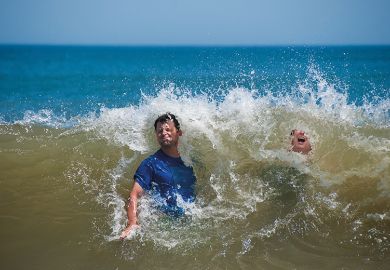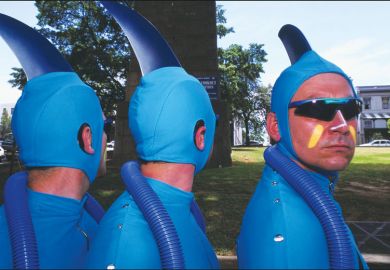For many years, the notional “40/40/20” arrangement that many tenured academics are employed under – allowing the equivalent of two days a week dedicated to teaching, two to research and one to service and community engagement – has been creaking under the mounting administrative demands that higher education institutions make on their staff.
Now, the coronavirus pandemic could push the model to breaking point, many academics fear, as Western universities’ budget crises force them to jettison the thousands of casual staff who often performed the bulk of teaching duties, and the rapid shift to online tuition places a heavy burden on scholars to create new programmes of learning.
Will this be the moment that leads to the creation of new employment models, perhaps ones that give equal prestige to teaching and to research? Or, more depressingly, are those academics lucky enough to keep their jobs destined to wilt under ever more unreasonable workload demands?
Whatever the answer, it seems likely that the challenges of operating with a much-reduced army of casual teaching staff will become rapidly apparent once the new term gets under way. In Australia, the Group of Eight said it expected its research-intensive member universities to lose 6,700 staff in the coming months, with researchers on fixed-term contracts making up some 4,400 of that group. In the state of Victoria alone, according to the National Tertiary Education Union (NTEU), 5,869 of the 7,427 job losses tallied so far in the state’s universities have involved insecurely employed staff, mostly casuals.
In the UK, the University and College Union has claimed that thousands of jobs are at risk, as institutions expect a dramatic drop in international student recruitment. If cuts that have already been announced by universities materialise and are replicated across the sector, the number of fixed-term contracts not being renewed could run into the tens of thousands – potentially up to 30,000 – the UCU has claimed.
For Andrew Norton, professor in the practice of higher education policy at the Australian National University, the figures showed that the teaching-research employment model was already unsustainable before the pandemic tipped it over the edge. “The domestic funding system does not support it any more,” he said.
“There’s much more demand for teaching than there is for research activity. To expect that teaching and research will grow at the same rate is not realistic. The government has created policies that make the teaching-research model hard to sustain. In some ways, we are making it basically impossible to have it as the dominant academic employment model.”
In Australia, international enrolments can bring in more money for universities than all government funding streams combined. Meanwhile, proposed reforms under education minister Dan Tehan’s “Job-ready Graduates” package could exacerbate the problem by bringing domestic bachelor’s course revenue in line with the costs of teaching the courses. This would all but erase universities’ ability to cross-subsidise research using profits from teaching Australian students.
Those academics who are left with jobs face the daunting challenge of taking on a greater teaching load, and doing much of this online – a process that often requires curricula to be completely redrawn, and presents staff with a steep learning curve in new forms of pedagogy.
John Holmwood, emeritus professor at the University of Nottingham, said he had seen “quite dramatic signs coming through” about the shifting priorities for universities.
“People are preparing for a radically changed curriculum, and that takes time…Universities are temporarily reducing research hours, while study leave has been cancelled,” he explained.
“At the same time as you have pressure to modify the curriculum – possibly it’s all online, possibly hybrid, while also preparing to get back to face-to-face – you have cut those who, whether we like it or not, have taken the teaching pressure off research-active staff.”
Jo Grady, general secretary of the UCU, agreed. “Fewer staff means the workloads of those remaining will increase. If remaining staff are expected to pick up the teaching slack, then inevitably there will be less time for research. Instead of cutting budgets for casual staff and refusing to renew fixed-term contracts, universities should be extending them for the whole duration of this crisis.”
The picture was similar in the US, according to Darren Linvill, an associate professor at Clemson University in South Carolina, who said “the biggest impact on research will be time and capacity”.
“Universities have focused on the prestige associated with research. You see universities hire a dozen staff to support grant applications for every one person hired to support teaching,” he said.
Now, academics must put a lot of effort towards online teaching to ensure that it is of a high standard, particularly if they want to attract large numbers of students. “An astounding amount of work is needed. I hope it will serve as a wake-up call about what is required to give students a meaningful experience,” Dr Linvill said.
Liz Morrish, a visiting fellow in the School of Languages and Linguistics at the UK’s York St John University, added that the pandemic had “amplified the existing inequalities in academia”.
However, the “fracking of academic careers” had begun pre-Covid. Those who produce lots of research but do not have grants, because they do not necessarily need them, often find themselves marked as “teaching-only”, while those with funding are set on the research path, and it is difficult to move between the two.
“Something needs to be done to prevent a huge amount of wasted careers and wasted talent,” Dr Morrish said.
Professor Norton said that while many academics aspired to teaching-research roles, properly formulated teaching-only careers would be preferable to “this terribly exploitative, uncertain casualised teaching system”.
“Actually having a job at a university – albeit one without much research involved – is better than being casual where you only work some months of the year [and] spread your work across several universities. It’s just not a good career.”
But Australia’s NTEU said that universities should not have to choose between abandoning the research-teaching nexus or ditching secure employment. “Neither of those are satisfactory options,” said national president Alison Barnes.
“Breaking the nexus between teaching and research is problematic, as is ever-increasing reliance on casuals. Academic freedom is undermined by insecure work. It’s not good for the people who perform it, and it’s not good for universities’ core functions. The real solution to the difficulties universities face is the federal government. The government really needs to come to the rescue of the sector.”
Professor Norton said that as long as their members wanted teaching-research roles – which most clearly did – unions would have little choice but to resist teaching-focused jobs. “They’ll reluctantly accept teaching-only as better than casual teaching contracts without really endorsing it as a career path.”
Most academics have PhDs, he noted. “By definition, someone prepared to subject themselves to three-plus years of research work to do a PhD has to be pretty interested in research.”
But surveys have revealed a persistent “minority” of academics who prefer teaching – “particularly more extroverted personality types who just enjoy that kind of interaction with the students”, Professor Norton said.
Academic reward structures, however, are not geared to such people, Professor Norton said. “They will struggle to be regarded as top of their field [because] you still get your glory in academia via your research achievements.
“Can you become a full professor without doing research? In a few institutions you can, but generally you can’t. So if you want to pursue that path, you’re stuck at the lower ranks of academia.”
Kathleen Fitzpatrick, director of digital humanities at Michigan State University, agreed that the reduction in numbers of teaching staff left academic careers at a crossroads.
“What remains to be seen is whether institutions, accreditors and funding bodies will take that shift in effort into account in the rewards structure,” she added. “Will the greatest benefits and prestige still accrue to scholars and to units that produce significant research results under the new model, or will the increased significance of teaching extend to transform the ways they are assessed? If research remains king, how will the existing gaps between haves and have-nots be exacerbated?” she asked.
UNSW Sydney is one of the institutions where teaching-focused academics can reach the pinnacle, having introduced education-focused roles in 2017. Vice-chancellor Ian Jacobs said about 300 staff so far had taken up these positions.
“I support an increase in people who specialise in education as long as [they] are properly recognised, rewarded and promoted,” Professor Jacobs said.
“The crucial role of education in our society has been undervalued, and that’s at our peril. If we do it in a way that recognises and rewards people who do it well, that will be greatly to the benefit of universities across Australia and globally.”
Ultimately, there will be a role for governments as well as for institutions in finding a secure employment model for universities and a healthy research base, said Graeme Reid, chair of science and research policy at UCL.
Covid-19 had shone a light on the fact that UK research had been “simply muddling through until the pandemic”, he said.
“However, the government has continued to state that it wants the UK to be a science superpower…making it possibly the best time in a generation to address the problem,” Professor Reid said.
“If the government puts the balance between grant funding and [quality-related] funding at the position it was at 10 years ago, it will give universities the flexibility that they need to run a creative, exciting research base.”
POSTSCRIPT:
Print headline: Teaching’s moment to shine, or just a career downgrade?
Register to continue
Why register?
- Registration is free and only takes a moment
- Once registered, you can read 3 articles a month
- Sign up for our newsletter
Subscribe
Or subscribe for unlimited access to:
- Unlimited access to news, views, insights & reviews
- Digital editions
- Digital access to THE’s university and college rankings analysis
Already registered or a current subscriber?








